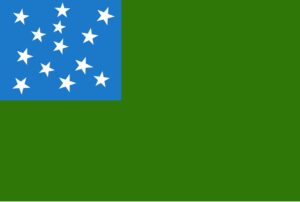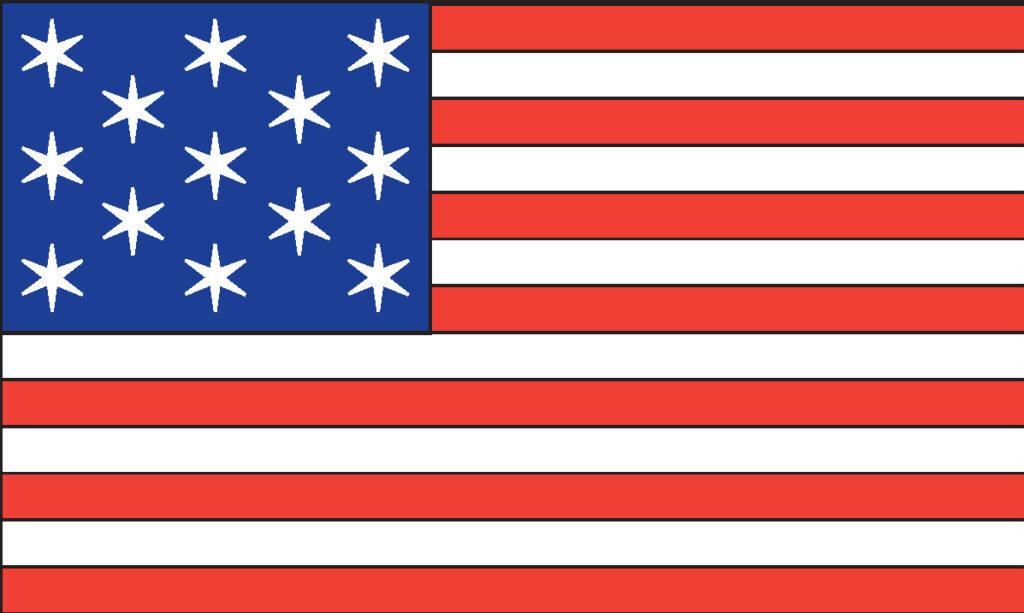The Vermont Constitutional Convention of 1777 adopts its first and only Constitution, declaring itself in the Preamble to be free and independent of both New York and Great Britain. the Preamble of which states:
WHEREAS, all government ought to be instituted and supported, for the security and protection of the community, as such, and to enable the individuals who compose it, to enjoy their natural rights, and the other blessings which the Author of existence has bestowed upon man; and whenever those great ends of government are not obtained, the people have a right, by common consent, to change it, and take such measures as to them may appear necessary to promote their safety and happiness.
And whereas, the inhabitants of this State have (in consideration of protection only) heretofore acknowledged allegiance to the King of Great Britain, and the said King has not only withdrawn that protection, but commenced, and still continues to carry on, with unabated vengeance, a most cruel and unjust war against them. … for the avowed purpose of reducing them to a total and abject submission to the despotic domination of the British parliament, with many other acts of tyranny … whereby all allegiance and fealty to the said King and his successors, are dissolved and at an end;
And whereas, the territory which now comprehends the State of Vermont, did antecedently, of right, belong to the government of New-Hampshire; and the former Governor thereof … granted many charters of lands and corporations, within this State, to the present inhabitants and others. And whereas, the late Lieutenant Governor Colden, of New York, with others, did, in violation of the tenth command, covet those very lands;
· · · · · · ·
They [New York and New Hampshire] have, and still continue, an unjust claim to those lands, which greatly retards emigration into, and the settlement of, this State.
· · · · · · ·
Therefore, it is absolutely necessary, for the welfare and safety of the inhabitants of this State, that it should be, henceforth, a free and independent State; and that a just, permanent, and proper form of government, should exist in it, derived from, and founded on, the authority: of the people only, agreeable to the direction of the honorable American Congress.
We the representatives of the freemen of Vermont, in General Convention met, for the express purpose of forming such a government, confessing the goodness of the Great Governor of the universe, (who alone, knows to what degree of earthly happiness, mankind may attain, by perfecting the arts of government,) in permitting the people of this State, by common consent, and without violence, deliberately to form for themselves, such just rules as they shall think best for governing their future society;
And Chapter I, Sections 1, 3, 5, 6, 7, 9, 10, 11, 13, 14, 15, 17, 18 and 19, of which state,
- THAT all men are born equally free and independent, and have certain natural, inherent and unalienable rights, amongst which are the enjoying and defending life and liberty; acquiring, possessing and protecting property, and pursuing and obtaining happiness and safety. Therefore, no male person, born in this country, or brought from over sea, ought to be holden by law, to serve any person, as a servant, slave or apprentice, after he arrives to the age of twenty-one Years, nor female, in like manner, after she arrives to the age of eighteen years, unless they are bound by their own consent, after they arrive to such age, or bound by law, for the payment of debts, damages, fines, costs, or the like. [emphasis added]
· · · · · · ·
- That all men have a natural and unalienable right to worship ALMIGHTY GOD, according to the dictates of their own consciences and understanding, regulated by the word of GOD; and that no man ought, or of right can be compelled to attend any religious worship, or erect, or support any place of worship, or maintain any minister, contrary to the dictates of his conscience …
· · · · · · ·
- That all power being originally inherent in, and consequently, derived from, the people …
- That government is, or ought to be, instituted for the common benefit, protection, and security of the people, nation or community; and not for the particular emolument or advantage of any single man, family or set of men, who are a part only of that community …
· · · · · · ·
- That every member of society hath a right to be protected in the enjoyment of life, liberty and property, and therefore, is bound to contribute his proportion towards the expense of that protection, and yield his personal service, when necessary, or an equivalent thereto; but no part of a man’s property can be justly taken from him, or applied to public uses, without his own consent, or that of his legal representatives; nor can any man who is conscientiously scrupulous of bearing arms, be justly compelled thereto, if he will pay such equivalent; nor are the people bound by any law’ but such as they have, in like manner, assented to, for their common good.
- That, in all prosecutions for criminal offences, a man hath a right to be heard, by himself and his counsel-to demand the cause and nature of his accusation-to be confronted with the witnesses- to call for evidence in his favor, and a speedy public trial, by an impartial jury of the country; without the unanimous consent of which jury, he cannot be found guilty; nor can he be compelled to give evidence against himself; nor can any man be justly deprived of his liberty, except by the laws of the land or the judgment of his peers.
- That the people have a right to hold themselves, their houses, papers and possessions free from search or seizure. …
· · · · · · ·
- That, in controversies respecting property, and in suits between man and man, the parties have a right to a trial by jury; which ought to be held sacred.
- That the people have a right to freedom of speech, and of writing and publishing their sentiments; therefore, the freedom of the press ought not be restrained.
- That the people have a right to bear arms for the defence of themselves and the State; and, as standing armies, in the time of peace, are dangerous to liberty, they ought not to be kept up. …
· · · · · · ·
- That all people have a natural and inherent right to emigrate from one State to another, that will receive them, or to form a new State in vacant countries, or in such countries as they can purchase [sic] whenever they think that thereby they can promote their own happiness.
- That the people have a right to assemble together, to consult for their common good-to instruct their representatives, and to apply to the legislature for redress of grievances, by address, petition or remonstrance.
- That no person shall be liable to be transported out of this State for trial, for any offence committed within this State.
And Chapter II, Sections 22, 24, 29, 33 and 35, of which
- Preserve the Right of Trial of Juries fully informed of their Power to judge the Law,
- Prohibit excessive bail and fines,
- Prohibit bribery in elections,
- Prohibit taxation for the mere privilege of existing,
- Provide for victim restitution as a part of criminal punishment.
NOTE: The Chapter I, Section I prohibition of slavery makes Vermont the first jurisdiction in the united States to prohibit slavery—and without a civil war.
[updated 11/16/2024]
Subsequent Events:
Authority:
unanimous Declaration (of Independence), Paragraph 6
ccc-2point0.com/unanimous_Declaration
References:
“Chronology of Events, 1774-1804,” from The Debate on the Constitution, two volumes, Bernard Bailyn, ed., (New York: Library of America, 1992), 2:1032.
The Avalon Project : Constitution of Vermont – July 8, 1777
avalon.law.yale.edu/18th_century/vt01.asp
vermont-archives.org/govhistory/constitut/pdf/con77.pdf
vermont-archives.org/govhistory/constitut/pdf/con77.pdf
Slavery in Vermont.mht
www.slavenorth.com/vermont.htm
CHRONOLOGY: Who banned slavery when? | Reuters
www.reuters.com/article/idUSEIC16869120070321
Constitutions of the Several states
www.thegreenpapers.com/slg/constitution.phtml


